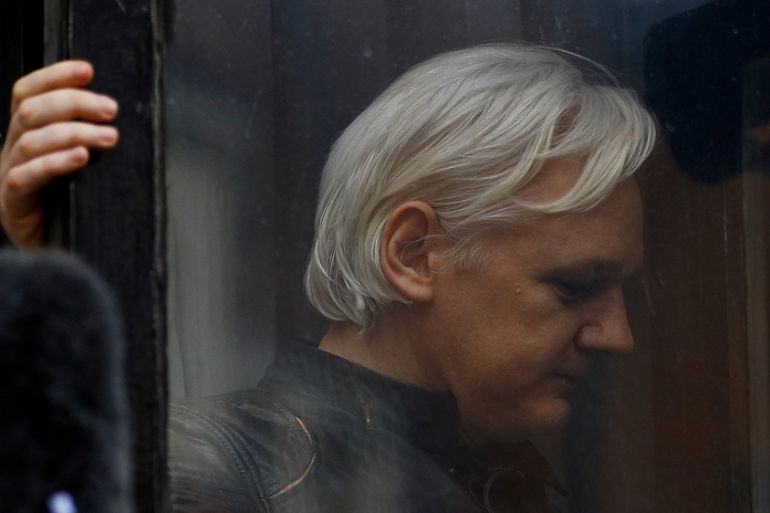Ecuador says it will not intervene with UK on behalf of Assange
Ecuador’s foreign minister says the Wikileaks founder should sort out his issues with Britain.

Ecuador‘s foreign minister says his country does not plan to intervene with the British government on behalf of Julian Assange in talks over his legal situation as an asylee in the South American country’s London embassy.
Foreign Minister Jose Valencia told Reuters on Tuesday that Ecuador’s only responsibility was looking after the Wikileaks founder‘s wellbeing, after the Australian national sued the country over new conditions placed on his asylum in the London embassy.
Keep reading
list of 4 itemsUK ruling on Julian Assange ‘killing him slowly’, say free speech advocates
UK court opens way for Assange to appeal US extradition
Julian Assange US extradition ruling updates: Assange wins brief reprieve
“Ecuador has no responsibility to take any further steps,” Valencia said. “We are not Mr Assange’s lawyers, nor are we representatives of the British government. This is a matter to be resolved between Assange and Great Britain.”
The lawsuit filed earlier this week, accused Ecuador of “violating his fundamental right and freedoms”.
In a statement, Wikileaks said Ecuador had “threatened to remove his protection and summarily cut off his access to the outside world”.
It also said that the embassy has refused journalists and human rights organisations to see him well as “installing three signal jammers in the embassy to prevent his phone calls and internet access”.
Statement: WikiLeaks publisher @JulianAssange launches case against his continued gagging, duress https://t.co/uVQbYRlth1 pic.twitter.com/dOuX6r8Hu4
— WikiLeaks (@wikileaks) October 19, 2018
Assange’s decision to start legal proceedings came days after Ecuador issued him with a list of rules to obey if he wanted to continue living in the embassy.
They included household rules, such as cleaning the toilet, looking after his cat, and paying his own expenses like food, medical and laundry, to more politically motivated ones, such as not to partake in any activity deemed to be interfering in the internal affairs of states.
The Ecuadorian foreign minister expressed “frutation” by the legal suit.
“There is no obligation in international agreements for Ecuador to pay for things like Mr Assange’s laundry,” he said.
Greg Barns, an Australian lawyer advising Assange, said in an email that “developments in the case in recent times” showed the need for Australia’s government to intervene to assist “one of its citizens who faces real danger”.
This action marks a departure from Ecuador’s previous practice of maintaining dialogue with British authorities over Assange’s situation since granting him asylum in 2012, when he took refuge in Ecuador’s London Embassy after British courts ordered his extradition to Sweden to face questioning in a sexual molestation case.
That case has since been dropped, but friends and supporters have said that Assange now fears he could be arrested and eventually extradited to the United States if he leaves the embassy.
Ecuadorean President Lenin Moreno has said that asylum is not meant to be eternal, but he has also expressed concern about the possibility that Assange might be extradited to the US.